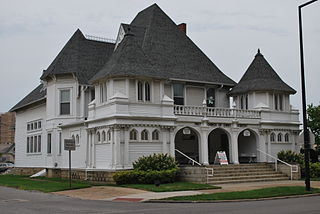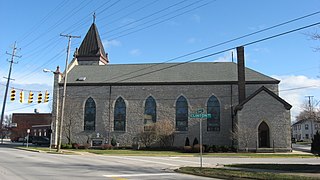
The St. George Antiochian Orthodox Church is an Antiochian Orthodox church across from Lake Eola, in Orlando, Florida.

Red Rock Center for the Arts is a historic structure located at 222 East Blue Earth Avenue, in Fairmont, Minnesota, United States. It was added to the National Register of Historic Places on May 18, 1988 as the First Church of Christ, Scientist. It is now owned by Martin County, which leases it to the Martin County Preservation Association.

The First Church of Christ, Scientist at 339 West Kaufman in Paris, Texas, is a former Church of Christ, Scientist church and an historic structure that, in 1988, was added to the National Register of Historic Places. It was then vacant. In 2009 it was being used by a Spanish-speaking Baptist congregation.

The former Second Church of Christ, Scientist, located at 655 Cedar Avenue, in Long Beach, California, is an historic structure that on April 1, 2005, was added to the National Register of Historic Places. It is now the Second Samoan Church.
The former First Church of Christ, Scientist is located at 300 East Burlington Avenue in Fairfield, Iowa, United States. It is an historic structure that on October 30, 1997 was determined to be eligible for addition to the National Register of Historic Places, but was not added. The building now houses St. Gabriel and All Angels Liberal Catholic Church.

Grace Episcopal Church is an historic Episcopal church located at 315 Wayne Street in Sandusky, Ohio, in the United States. On October 20, 1982, it was added to the National Register of Historic Places.

St. Stephen's AME Church is an historic African Methodist Episcopal Church building located at 312 Neil Street in Sandusky, Ohio, in the United States. On October 20, 1982, it was added to the National Register of Historic Places.

The former Odd Fellows Hall, located at 231 West Washington Row in Sandusky, Ohio, in the United States, is an historic building built in 1889 by members of the Independent Order of Odd Fellows. It is also known as the Independent Order of Odd Fellows Temple. On May 1, 2003, it was added to the National Register of Historic Places.

First Church of Christ, Scientist, located at 309 East Avenue, in Elyria, Ohio, in the United States is an historic structure that on July 18, 1975, was added to the National Register of Historic Places. As of 2018 it is now known as Christian Science Society of Elyria-Lorain.

The former First Church of Christ, Scientist in Forest Grove, Oregon, United States, is a historic Christian Science church built in 1916. It was designed by Spencer S. Beman, son of the noted designer of Christian Science churches, Solon Spencer Beman who had died in 1914. On January 21, 1994, it was added to the National Register of Historic Places.

The former First Church of Christ, Scientist is an historic Christian Science church building located at 1200 North Robinson Avenue in Oklahoma City, Oklahoma, United States. Built in 1920, it was designed in the Classical Revival style of architecture. On September 9, 2001, was added to the National Register of Historic Places.

The former First Church of Christ, Scientist, located at 2200 Overlook Road, in the University Circle area of Cleveland, Ohio, in the United States is an historic building that was added to the National Register of Historic Places on February 20, 2003.

The former First Church of Christ, Scientist, located at 2704 Monroe Street, in Toledo, Ohio, is an historic building built in 1898. It was added to the National Register of Historic Places in 1978, at which date the building was Universal Community Church. First Church of Christ, Scientist, Toledo, now holds services at 4647 West Central Avenue at Corey Road in Ottawa Hills.

The former Third Church of Christ, Scientist built in 1906 is an historic Christian Science church building located at 3648 West 25th Street in Cleveland, Ohio, It was designed in the Classical Revival style by noted Cleveland architect Frederick N. Striebinger.

The former First Church of Christ, Scientist, built in 1912, is a historic Christian Science church edifice located at 1366 South Alvarado Street in Pico-Union, Los Angeles, California.

Holy Angels Church is the oldest extant church building in the Roman Catholic Diocese of Toledo and Erie County, Ohio. The stone Gothic Revival style church is located on West Jefferson Street at Tiffin Avenue and Clinton Street in Sandusky, Ohio.

George Feick was a German-American builder in Sandusky and Oberlin, Ohio. His works include the Wyoming State Capitol, multiple buildings at Oberlin College, and numerous office buildings, churches, schools, libraries and residences in and around Sandusky. Several of his works are listed on the National Register of Historic Places.

The Erie County Jail is a historic Stick/Eastlake building located on Adams Street in Sandusky, Ohio. It was built from 1882 to 1883 by the firm of Adam Feick & Brother, which consisted of Adam, Philip, and George Feick. The structure was designed to have 26 cells and a sheriff's residence. It was listed on the National Register of Historic Places in 1982. The building is now part of the Sandusky Library.

Elmwood Historic District–West is a national historic district located at Buffalo, Erie County, New York. The district encompasses 1,971 contributing buildings, 4 contributing structures, and 13 contributing objects in the Elmwood Village neighborhood of Buffalo. It is built around the Buffalo Parks and Parkways system bounded on the north by Delaware Park, Forest Lawn Cemetery, and the former Buffalo State Asylum, on the south by the Allentown Historic District, and on the east by the Elmwood Historic District–East. This predominantly residential district developed between about 1867 and 1941, and includes notable examples of Queen Anne, Shingle Style, Colonial Revival, Tudor Revival, and American Craftsman style architecture. The district contains one of the most intact collections of built resources from turn of the 20th century in the city of Buffalo and western New York State. Located in the district are six previously listed contributing resources including the Richmond Avenue Methodist-Episcopal Church and the Buffalo Tennis and Squash Club. Other notable building include the H.C. Gerber House (1908), the Fred Dullard House (1910), the William H. Scott House (1904), St. John's-Grace Episcopal Church designed by Bertram Grosvenor Goodhue (1925–26), Davidson House (1885), former Jehle Grocery Store and Residence, St. Luke's Episcopal Church, Temple Beth El, Richmond Avenue Church of Christ (now Bryant Parish Condominiums, and Pilgrim-St. Luke's United Church of Christ.






















